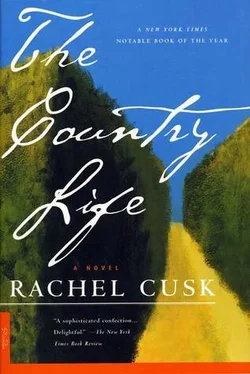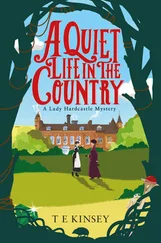I left the kitchen as speedily as Mrs Barker’s laden coffee cup would allow, with Pamela forlorn and subdued at the table. Being rather more familiar now with the route by which the rooms at the back of the house connected with those at the front, I found my way to the hall without too much difficulty. At the far end of it I spied Mrs Barker, who was standing at the front door with her back to me engaged in some extraordinary form of activity. I could not be clear of what exactly she was doing; but whatever it was, she was doing it so energetically that her ample rear portion was vibrating. I was surprised, and somewhat disgusted, to find myself suspecting her of performing there in the hall in broad daylight the act I had carried out in the secrecy of my bedroom the day before. As I drew closer — she was so absorbed in her task that she did not notice my approach — I found myself growing horribly fascinated by her oscillations, and stood for some seconds with my eyes fixed upon her posterior. A moment of some embarrassment was, then, to be mine when finally she sensed my presence behind her and turned from her labours to confront me. I saw that she held in one hand a cloth and in the other a tin of polish; evidence, if any were needed, that she was indulging not in the practice of self-gratification but rather of cleaning the brass doorknob. Her rhinal glare strove to wither me where I stood; but no amount of hostility, not even the threat of actual physical assault which her ready bulk seemed to proffer, can justify the words with which I chose to address her.
‘Here’s your coffee, you cunt,’ I said.
Although I am prepared to admit, and even swear, that I spoke this terrible word, some greater and mysterious force denied it. On the radio they have a button which can be pressed if some indiscretion or obscenity is uttered on air; a ten-second delay, I think it is called. In other words, things are happening, on the radio, ten seconds in the future, by which means the present moment can be cleansed. I have always thought that this would be a useful device to have in life; and on this occasion I seemed to have been provided with it. I am not saying that some kind of magic, scientific or otherwise, came into play in my encounter with Mrs Barker; rather that denial, which after all is the essence of this button, did the work in extremis of this ingenious invention. I denied that I had said it; Mrs Barker denied that she had heard it; in short, our situation denied that such a thing could be possible; and voilà ! It never happened.
‘Thank you,’ said Mrs Barker. She seemed slightly uncomfortable, as if she knew that something had occurred but couldn’t remember what it was, like people in films who are abducted by aliens or go travelling through time, returning to the exact moment at which they left and with only a void or vacuum of memory to show for it.
‘Could you direct me to Martin’s bedroom?’ I politely enquired; tempted to try the trick again but not daring to.
‘You’ll find it to the left at the top of the stairs,’ said Mrs Barker. She hesitated, her fleshy brow still slightly crinkled with confusion, and then turned her attention once more to the doorknob.
Quickly I made my way up the capacious staircase, noting as I climbed the fine, deep carpet which softened my tread and proclaimed the upper realm to be one of comfort and repose. On the landing above, pale walls and delicate framed watercolours continued this theme. A Victorian rocking horse stood beneath the window directly ahead of me, a nursery motif. Pamela really was a dab hand at interior decoration.
Turning left at the top of the stairs, I arrived at a closed door which I guessed was the entrance to Martin’s bedroom. I stood outside it for a moment in order to collect myself. The abominable rudeness with which Martin had behaved, not only towards me but also towards his mother, on the last occasion we met, returned to my mind and filled me with apprehension.
I summoned up the courage to knock on the door — two swift raps — and was surprised when a cheerful ‘Come in!’ was relayed to me from the other side. I entered, noticing the well-polished brass doorknob, and found myself in a large room, above whose clutter rose two tall windows which looked out to the front of the house. At the foot of each window was an indented seat, with long panelled shutters on either side folded back like birds’ wings. In spite of its elegance, the room was very untidy; so much so, in fact, that for a few seconds I was unable to locate Martin. Bookshelves sagging with their cargo lined an entire wall; adjacent to them was a desk piled high with more of the same. Strewn across the floor was the usual detritus of adolescence: brightly coloured record sleeves littering the carpet as indiscriminately as fallen leaves, knotted items of clothing, ancient, corroded coffee cups. Stray, small shoes, as dejected and heartbreaking as a child’s shoe found on a beach, were the only evidence of Martin’s abnormality. Mrs Barker would, I felt, take no prisoners here when she stormed the barricades at ten o’clock.
‘Oh, it’s you,’ said Martin. He was sitting in his wheelchair by the bookshelves, as camouflaged as a forest creature in foliage.
‘It’s me,’ I replied, quite sternly; in my moment of contemplation outside the door I had decided on a firm approach.
‘Come in.’ He wheeled round in his chair and gestured with his long arm. ‘Sit down.’
There was a leather armchair beside him and he leaned forward from his chair — so steeply that I feared he might fall out of it — to sweep it free where the tide of jumble had risen over the seat. I weaved my way across the room and sat obediently beside him. The chair was most comfortable. I was aware of the fact that in a matter of seconds any authority I might have possessed had been wrested from me; but curiously, I did not mind. There was something righteous about my charge’s presence in this sunny room which his presence in other rooms had so far entirely lacked. I had the feeling that all who entered here abided by his law.
Now directly beside me, Martin was engaged in a close examination of my face. I caught a glimpse of his, the terrible, preternatural spectacle of his features, before I was compelled to look away, embarrassed by my recollection of the sunburn. Immediately I became anxious that he might think me repelled not by my own appearance but by his, and so directed myself to yield to his gaze once more.
‘You look nice,’ said Martin finally, as if he had arrived at this judgement by a complex means of assessment which I might well have failed.
It is hard to describe the way in which Martin’s mouth moved when he laughed or spoke — I have attempted it before — but it was unlike any physiognomical procedure I had witnessed before in my life. His lips incised in parallel almost the entire span of his face, and gave it the odd appearance of being divided into two parts or blocks connected, perhaps, by a hinge at the back of his head; so that one had the feeling, particularly when he opened his mouth wide — which he did frequently — that the upper section of his head could at any moment flip open, revealing his brain sitting like a steaming cauliflower on a platter. Some possible obstruction in his larynx gave his voice a nasal, remote quality; rather like a ventriloquist’s dummy, which reiterated the resemblance to a puppet or doll I noted some time ago. His thick tongue, whose unfortunate appearance in the kitchen had left its image firmly engraved on my mind, gave him a slight lisp.
‘Thank you,’ I said, surprised. Disingenuously, I added: ‘So do you.’
‘Ha! Ha!’ Martin’s mouth opened so wide that I genuinely feared the flipping mentioned above. His laughter was loud and I caught a gust of his breath, which was surprisingly sweet. ‘Ha! Ha! That’s very funny.’
Читать дальше












